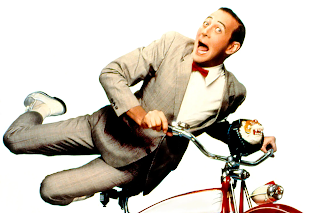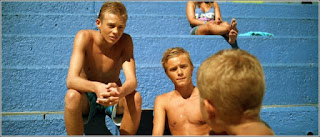Greig here, reporting for Stones of Erasmus! I’ve just caught the Doctor Who Christmas special, “Joy to the World,” now streaming on Disney+. Featuring Ncuti Gatwa as the Doctor, and Nicola Couglan as the Doctor's newest companion, Joy—the episode delivers a heartfelt holiday romp that deftly balances time-warp shenanigans, cozy Yuletide feelings, and profound meditations on loneliness. Below is a spoiler-filled review, pieced together from my own viewing and reflections—as well as tidbits you’ll see mirrored in fan discussions online. Let’s hop into the TARDIS and go!
 |
| "Ham and cheese toastie and a pumpkin latte?" Yes. Please! Image Credit: Disney+ |
Plot Summary: A Time Hotel and a Bomb-Star
Premise. Fresh off the heartbreak of losing Ruby Sunday in last season’s final episode (“Empire of Death”), the Doctor finds himself wandering solo once again. This time, though, his path leads him to a futuristic “Time Hotel,” where it’s Christmas every moment—simultaneously. Patrons pop in and out of doorways leading to any Christmas from any time or place, which makes for a whimsical, if slightly disorienting, holiday getaway.
Loneliness and Joy. The Doctor’s search for a companion is a well-trodden theme—think back to the Ninth Doctor meeting Rose Tyler at the start of the show’s 2005 revival. Eccleston's Doctor was a sad-sack sort of a guy. Or, even Matt Smith's Doctor, before he meets Amelia Pond. In “Joy to the World,” the Doctor’s latest potential friend is Joy, a hotel guest who reveals a painful past: she was unable to see her mother in her final hours during the COVID-19 pandemic. Over the course of the special, Joy becomes entangled in the machinations of the Villengard Corporation, who have concocted a threat so preposterous only Doctor Who could pull it off—a bomb made from an incubating star, hidden inside a dinosaur.
Holiday Hijinks. The central comedic—and cosmic—conceit sees the Doctor sneaking through the Time Hotel’s ever-shifting corridors, inadvertently stumbling onto the Orient Express, engaging in Rube Goldberg–style escapades, and saving the day with a mixture of scientific know-how and plenty of empathy. Ultimately, the star that could have detonated as a cosmic bomb instead hearkens back to the Star of Bethlehem—tying together the show’s Christian allusions with the Doctor’s timeless message of hope.
Themes & Analysis: Solitude, Star of Bethlehem, and Home
Alone at Christmas. Tying in real-world statistics about those who spend Christmas alone, “Joy to the World” shines a light on the Doctor’s enduring isolation. The script cleverly parallels the Doctor’s solitary existence with Joy’s own journey: both are searching for connection, but they shy away from it out of hurt or regret. Watching them bond—when the Doctor reveals he spent a year waiting for a Time Hotel doorway to reopen—grounds this Christmas special in surprisingly raw emotion.
The Doctor on the Psychology of Hotel Rooms:
I just spent a year in a hotel room that you chose. Do you know what you can tell about a person from the hotel room that they choose?. . . . So you see, a house, that's a . . . that's a disguise. It's a fortress. You can . . . you can hide yourself away with pictures and flowers and tables. But a hotel room? That's you without make-up. It's what you think you need. It's what you are willing to accept. Not a selfie that you posed for, more like catching yourself in the mirror. What's your mirror telling you . . . .?
Finding Home in a Hotel Room. One of the most poignant lines (which I reprinted above for convenience sake) addresses what it means to choose a particular hotel room as “home.” A house can mask who we are, but a hotel room is a quick choice that often reveals our unfiltered wants and emotional states. Joy’s reasons for picking a dull, almost drab room speak volumes about her sorrow—and the Doctor’s year-long stay there symbolizes how stepping into someone else’s space can illuminate both their pain and your own.
A Yuletide Miracle. The biblical references are more than window dressing. The Star of Bethlehem (and Saint Augustine’s idea that it was created as a miraculous sign) resonates with the show’s whimsical claim: perhaps each one of us has the capacity to “shine” like a star, or be guided by someone else’s light. This is typical Doctor Who: whether it’s a tyrannosaur swallowing a star-bomb or a grief-stricken companion longing for closure, the show always circles back to the miracle and fragility of being human.
Final Thoughts: A Whimsical, Welcoming Christmas Tale
While “Joy to the World” crams in a dizzying array of plot threads—part Victorian train chase, part apocalyptic star-bomb standoff—its real triumph is the Doctor’s renewed sense of empathy. Even if the pacing feels rushed at times, the episode’s emotional center holds firm: we see a lonely alien traveler and an ordinary human, both caught in cosmic chaos yet strangely united by the universal longing to not be alone during the holidays.
Where the story truly succeeds is in reminding us that each person’s inner life is worth exploring. Whether it’s a fleeting cameo on a train or a quiet conversation about grief, every encounter has the potential to transform. And what better day than Christmas—when so many people struggle with isolation—to give audiences an allegory about love, hope, and the star shining in each of us?
“Joy to the World” might not be the Doctor Who holiday special you were looking for (fact-checkers note that it’s helmed more by the Disney-peeps, and is not solely BBC property), but in the realm of imaginative Christmas adventures, it’s a cozy gem. And if you’ve found yourself alone this holiday, let the Doctor’s foray into the Time Hotel remind you: you’re okay, and connection is always a possibility—even in the strangest of places or the simplest of gestures.
Stray Observations
- The Doctor speaks in his usual timey-wimey, scientific manner in most episodes (think, "Reverse the polarity of the neutron flow"), and in this episode, "mavity" is back, with the Doctor quipping something about rotational gravity. If you know, you know.
- Steven Moffat wrote "Joy to the World," and it shows—it's a smart move on Russell T. Davies's part. As showrunner, he isn't shy about including past writers while staying true to the show's vision.
- I loved the nod to last season’s episode “Boom”—with ticking bombs, collateral damage, and the sentient consciousness heroes—Villengard's victims—(RIP Trev, and the Silurian).
- I appreciated the nuanced portrayal of Anita Benn, the Sandrighman Hotel proprietor, played by Stephanie de Whalley. Her character's understanding of Ncuti Gatwa's Doctor resonates with the queer audience; in a poignant moment, she empathizes with the Doctor, noting that neither of them has a boyfriend.
- Additionally, the woman the Doctor encounters reading Agatha Christie's Murder on the Orient Express—Sylvia Trench, portrayed by Niamh Marie Smith—was revealed to be writing a letter to her girlfriend. I wished she had more screen time.
Happy holidays, fellow Whovians, and may your own hotel room—literal or metaphorical—feel a little less lonely this season.
—Greig,
Stones of Erasmus









